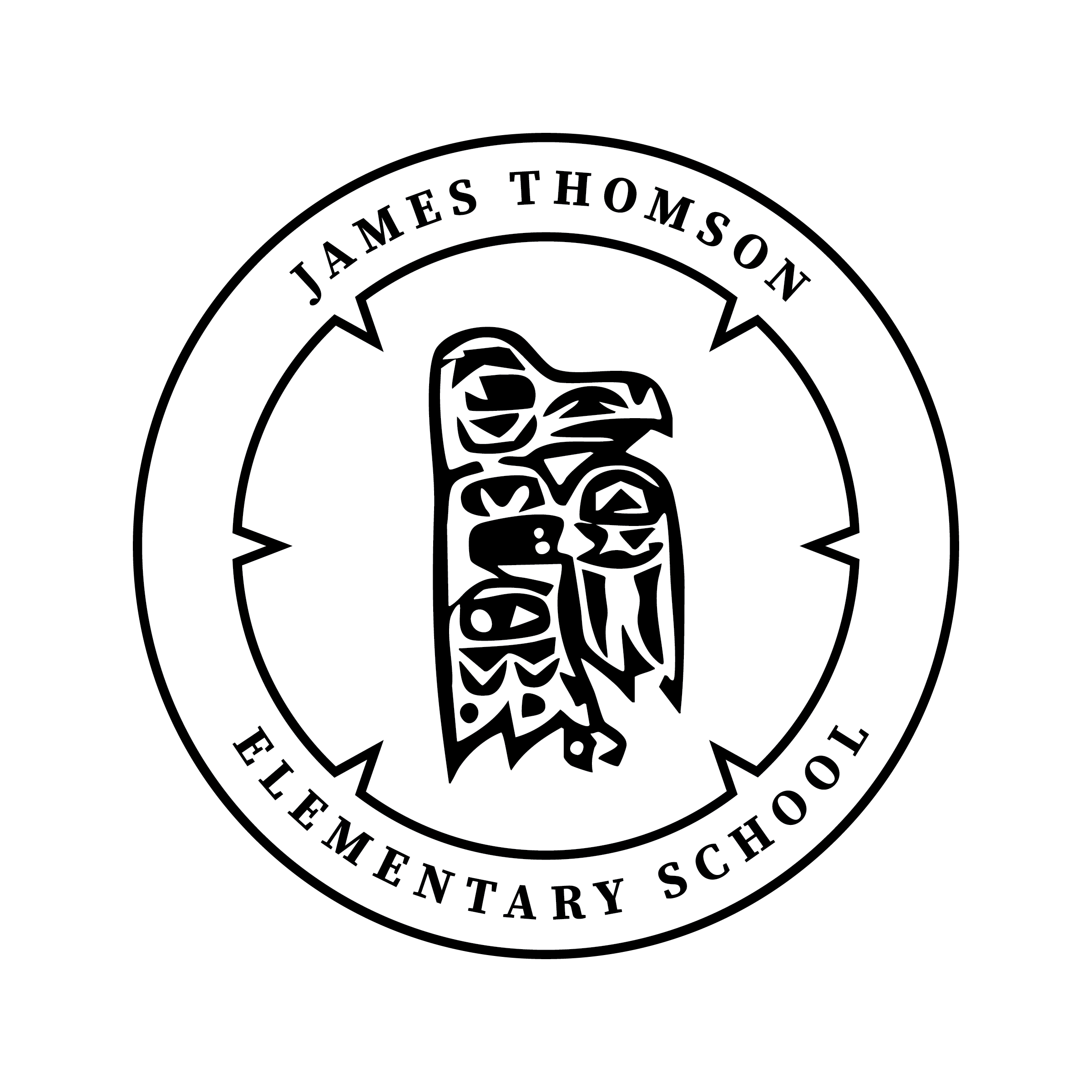Policies
Rules & Regulations
Supervision and Student Safety
James Thomson grounds are supervised Monday through Friday by teachers, EA's and the principal during the following times:
Before classes commence - 8:45 am to 9:00 am
Recess - 10:30 am to 10:45 am
Lunch Recess - 12:00 pm to 12:30 pm
After dismissal - 2:49 pm to 3:04 pm
A reminder that the grounds are unsupervised at all other times before and after classes. We often have sightings and see evidence of bears and cougars in our wooded area and field. There are often times groups of older children present after school on our grounds. To ensure your child's safety we request that students arrive at school no earlier than 8:45 am and leave by 3:00 pm. Activities that occur before or after classes, are under the supervision of a teacher are of course encouraged and supervised.
Please note that the school district offers before school care and after school care at James Thomson.
Transportation
Many children come to JT independently, by foot or bicycle. For safety reasons we require that children who ride bikes to JT;
- Wear bike helmets while riding bikes.
- Obey the rules of the road to and from school.
- Lock their bicycles to the bike racks.
- Refrain from riding bikes on the school grounds.
We allow students who ride scooters to JT to follow the rules for bicycles with the exception that they may store their scooters in their classroom cloakrooms.
Pick Up and Drop Off
Parents often pick up and drop off students by car. We have an extremely limited parking lot and for safety reasons, we appreciate your cooperation in parking your car on the street to pick up and drop off students. Please ensure your child crosses at the crosswalk if they are being picked up by car. Please do not park in the crosswalk and obey the speed zone of 30 km when dropping off and picking up children.
Social Responsibility at JT
Staff Expectations of Students on the Playground
The school staff works hard to foster a caring attitude among the students (older students are encouraged to look after younger ones, etc.).
From time to time, students must be reminded not to harm anyone, either physically or verbally. Fighting of any sort, even 'play-fighting,' is forbidden, as are any activities where students could be hurt (e.g., throwing snowballs).
Problem-Solving Procedures
At James Thomson, the staff members view discipline as an opportunity for students to learn appropriate ways of interacting in a social setting. (They honor students' rights to access a broad education in all areas of the curriculum, but with these rights come certain responsibilities that students learn to understand and accept as part of their overall development.)
At James Thomson Elementary School, responsible students - Acceptable Conduct: -
- • Act in a safe and kind manner.
• Keep their hands and feet to themselves.
• Attend school and classes regularly and punctually.
• Apply themselves to the best of their ability in all aspects of their education.
• Treat all people with respect and consideration.
• Follow the directions and reasonable requests of staff members.
• Remain on the school grounds during the day unless they have permission from a parent and have checked in with the office prior to leaving.
• Play in the designated areas during recess and lunch.
• Be respectful of the thoughts, feelings and heritage of others.
• Respect the rights and property of others.
• Show respect for the building and playground equipment
• Report to a responsible adult, incidents of threats, bullying, harassment, or intimidation.
• Use of district-owned and personal electronic devices in a courteous, responsible and ethical manner
Consequences at the Classroom Level or on the Playground
In general, the process is as follows:
Step 1 - Remind and Redirect - reminders to the student from an adult.
Step 2 - Give a Choice - or go straight to step 3 - the adult will give student a choice and notice that this is a final warning.
Step 3 - Consequence - a) Teacher / classroom level. Based on the situation can be a removal from the area (time out), or a restorative - mediation.
b) Referral to Principal - student will remain out of class until there has been an opportunity to address the issue or behaviour through the office.
Administrative Policies (AP)'s that guide these processes are:
; ; ,
Consequences Consideration is given to the age and maturity as well as the intellectual, social and emotional capacity of the student along with the nature and frequency of the unacceptable behavior. Minor problems are dealt with on the spot through discussion and reminders of expectations, or the possibility of logical consequences
(eg. misusing materials or equipment could lead to a loss of privileges for a specified period of time)
Students who continue to make poor choices in spite of minor consequences, or whose actions fall in the “unacceptable” group will be given escalating time-outs from the playground or classroom. This will generally involve a problem-solving session with a staff member during the lunch break. During this time, students will discuss more appropriate strategies and could work out a written plan for how they can handle similar situations in the future.
For the most serious of school-level problems at the discretion of the principal (or designate), the consequences may include an in- and/or out-of-school suspension.
Consequences will, where appropriate:
• be thoughtful, consistent and fair
• seek to prevent a recurrence of the offense
• teach acceptable social behavior rather than be merely punitive
And where appropriate:
• provide means for restitution and restorative actions
• involve the offender in determining a corrective plan of action
School Buses
The school bus rules are explained fully in - .
Students who demonstrate poor behaviour on the bus may lose this privilege for a specified length of time. If this occurs, parents are held responsible for making alternate travel arrangements for the following day (or days). Please discuss with your child what he/she is to do if this occurs, and advise the school of your decision for that day (or those days).

